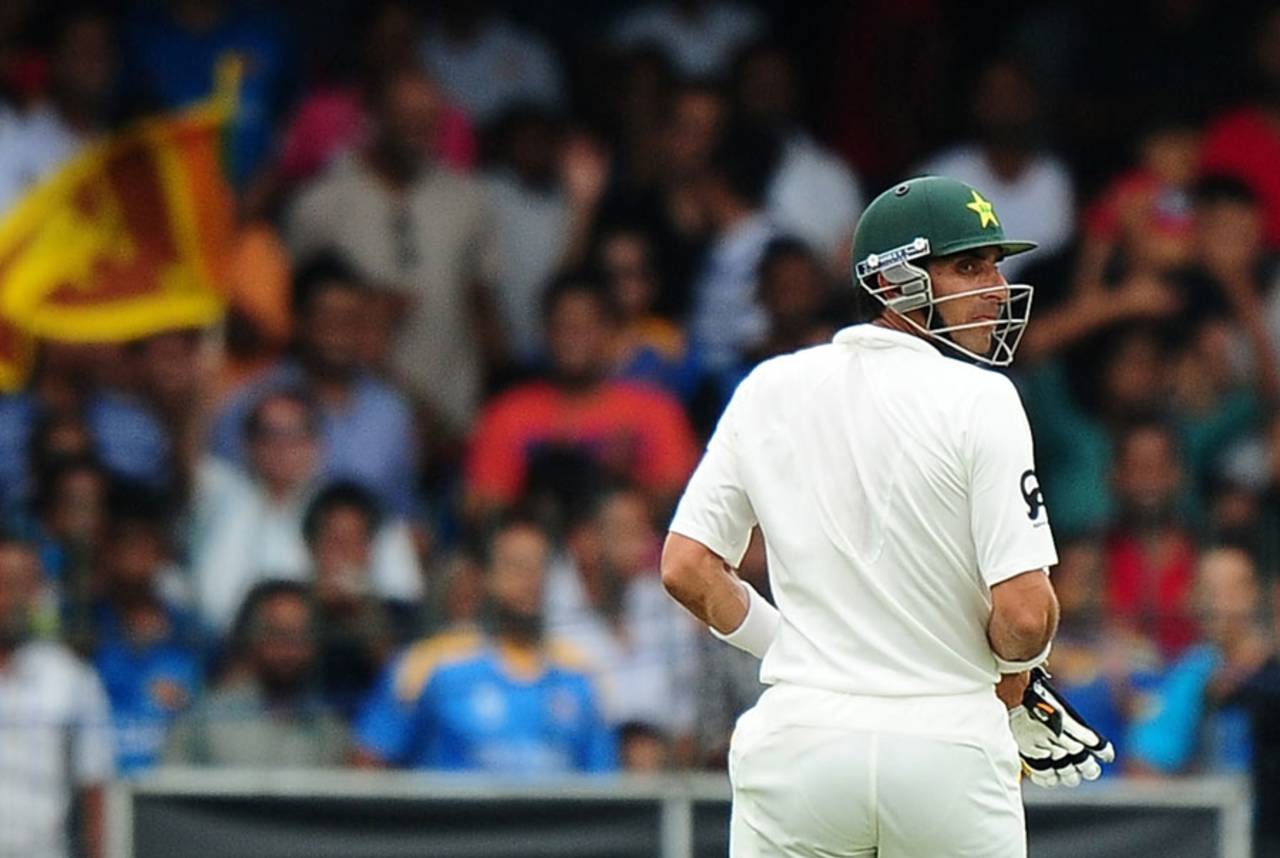Misbah's place in Pakistan history
He was the next great leader after Abdul Kardar and Imran Khan, standing between Pakistan cricket and its end
Kamran Abbasi
14-Oct-2014

Like every great leader, Misbah put the team first • AFP
Misbah-ul-Haq is a sober man full of surprises. Defying age and adverse circumstances, Misbah has carried the responsibility for his country's cricket on ever more drooping shoulders. Sportsmen, and particularly their managers, who represent high-profile teams, love to mention the weight of the shirt that they are wearing: the expectations of supporters, their own ambitions, and the scrutiny of television cameras create an unbearable pressure for some players, whose best performances are reserved for low-intensity encounters.
Misbah is no such man. He has faced the demons of Pakistan cricket and clutched them to his bosom. Whether or not you agree with Misbah's methods, there should be no questioning his willingness to accept the immense challenge that Pakistan cricket has posed in this post-Mumbai, drone-war era. The team and Pakistan are first, says Misbah, on his surprise decision to step down from the final one-day match against Australia. It is a statement rarely heard from Pakistan cricketers, and hats off to you Misbah for it.
AH Kardar was the first to bend Pakistan cricket to his will, helping establish his nation as a competitive team in international cricket. Kardar was Pakistan cricket's first great leader, whose immense contribution is forgotten with the death of his contemporaries and our fading memories.
Next came Imran Khan, king of herding Pakistan's big cats, and a man whose strength of personality and fearless approach transformed a competitive cricket team into a powerful one. Imran led Pakistan to victories in England and India, matched West Indies home and away when all others were being crushed, he won a World Cup. But perhaps his greatest legacy was the way positive, daring cricket became associated with Pakistan.
Wasim Akram was heir to Imran, prince to the king of herding cats, but Wasim required as much herding as the next man. Try as he might he never matched his mentor's moral authority or success. It was always going to be hard to follow Imran. Wasim was a great player in his own right as well as an aggressive captain, which should have been enough except for the expectation that had built up in the 1980s and the start of the 1990s. The weight of the shirt was now bothersome. Inzamam-ul Haq, another acolyte of Imran's, attempted to apply his own philosophy, the binding power of religion combined with a more restrained form of cricket. It worked to some degree, especially while Bob Woolmer was involved, but such pragmatism went against Pakistan's nature. Inzamam's leadership seemed greater off the field, in worldly and heavenly matters, instead of on it in the heat of battle. Neither of these men, though, were in the category of Kardar or Imran.
Other captains came and went and the great miss was Younis Khan, whose opportunities coincided with especially poisonous times in Pakistan cricket, when a good man had no value. As a consequence, disgrace and dishonour dogged the national team until Misbah began to lead his country out of the spot-fixing calamity of 2010. The reputation of his fellows was zero. International cricket was finished in Pakistan. The measure of Misbah's success is that despite deteriorating circumstances at home, and an end to the pipeline of international cricketers being produced, the world has continued to take Pakistan cricket seriously. His form protected him, he won critics to his side, and the baying mob was kept muzzled. Misbah's achievement is such that despite his many enemies he has captained the national team for at least three years longer than might have been expected.
The mirage of a competitive team is now over. The veil of concealment is lifted. Pakistan cricket is bankrupt in ideas, talent and finances. An enduring political crisis condemns the politicised cricket board to new heights of ineffectiveness. A nation in crisis is no environment to rebuild cricket. The decay is irreversible until Pakistan recovers as a country. Sporadic triumphs will enthrall us still but these will merely be the guerrilla attacks of a fading band of irregulars. The truth is before us, laid bare and demoralising.
Pakistan cricket, the vision of Kardar, and the fearlessness of Imran are beacons of hope that are fading fast. And it was the dead-hand, deadly dull but indomitable leadership of Misbah that kept the flame alive in these latter days. Misbah's success cannot be measured by statistics, by series won or lost. Misbah's place in Pakistan's history can only be judged against the crushing adversity of this age. Love him or loathe him, whether he is hero to you or villain, it was Misbah-ul-Haq, the next great leader after Kardar and Imran, who stood between Pakistan cricket and the end.
Wish him well.
Kamran Abbasi is an editor, writer and broadcaster. @KamranAbbasi